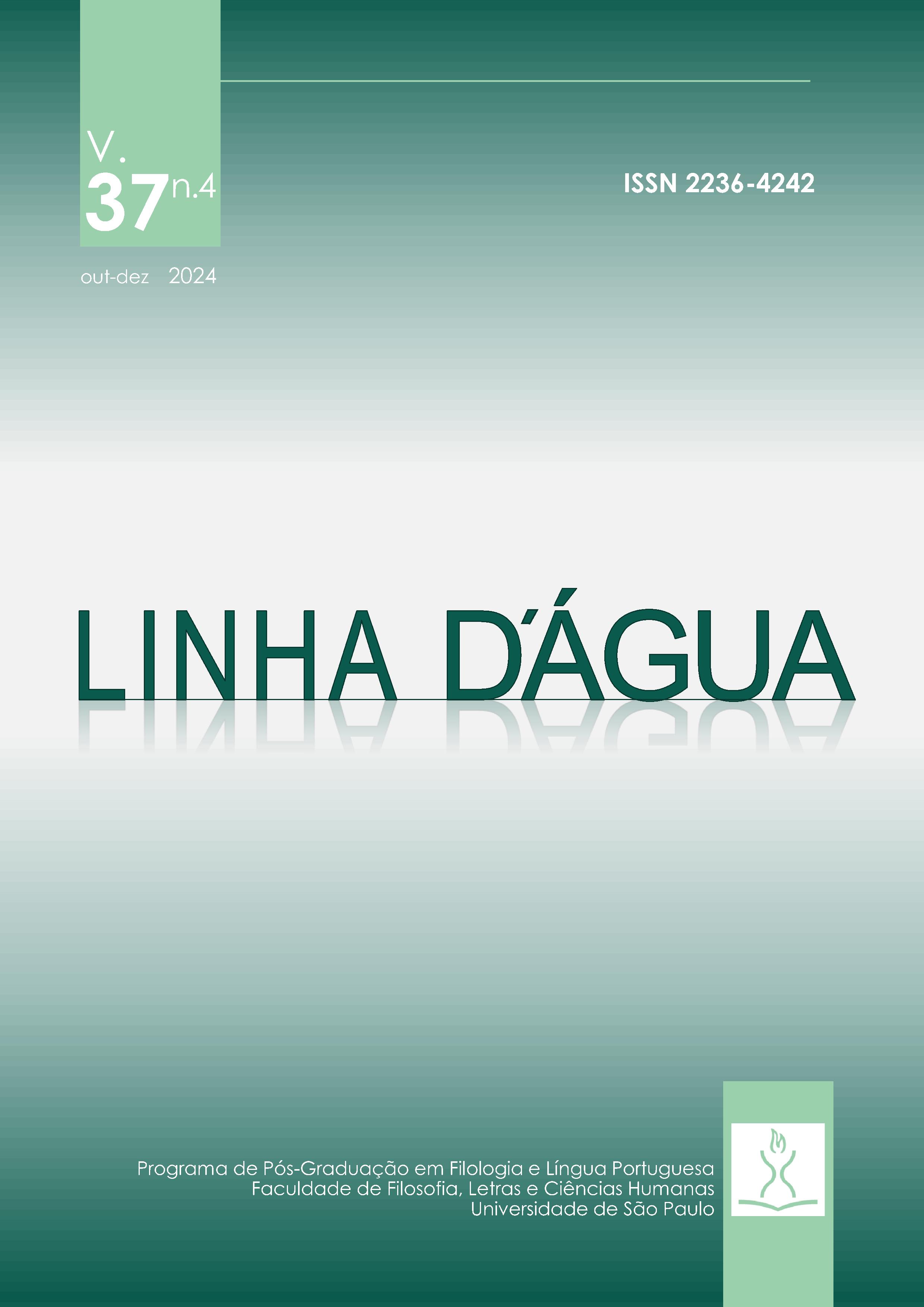The repeatability of a discourse genre and the repeatability of history: centralization and universalization
DOI:
https://doi.org/10.11606/issn.2236-4242.v37i4p23-39Keywords:
Letter of Caminha, Letter to Icamiabas, LetterAbstract
In this paper, I assume the repeatability of discourse genres to establish a parallel between two emblematic letters in the history of Brazil’s literary (and documental) production: the Letter to the Icamiabas (a chapter in Mario de Andrade’s novel Macunaima) and the Letter of Pero Vaz de Caminha. The repeatability of genres is also home to the repeatability of history and this is the reading that, in this work, guides the exploration of the immanence of historical data in linguistic data. Both letters present a displacement in space, a journey. I conclude that: (a) in the case of Letter of Caminha, there is the centralization of power by a state and a sovereign, linguistically present in the search for accuracy in the descriptions and calculations of power, as universalizable elements; (b) in the case of the Letter to the Icamiabas, the centralization of power is pure chimera and the universalization is nothing more than containment, despite the hyperbolic announcement – outside any pretension of accuracy – of a power that is spinning in a false direction; (c) the closeness between the two letters, marked by the request for help, places the legendary aspect of the mythical hero in the order of the historical character, at the same time as allowing me to observe the historical being embodied in the official scribe of the armada in his legendary aspect.
Downloads
References
ALMEIDA PRADO, J. F. de. A carta de Pero Vaz de Caminha. Rio de janeiro: Agir, 1965.
ANDRADE, M. de. Macunaíma, o herói sem nenhum caráter. 13. ed. São Paulo: Martins, 1976.
BENSA, A. Images et usages du temps. Terrain: Carnets du Patrimoine Ethnologique Vivre le temps. Paris, s/v, n. 29, p. 5-18, 1997.
CANDIDO, A. A passagem do dois ao três (contribuição para o estudo das mediações na análise literária). Revista de História, São Paulo, s/v., n. 100, p. 787-800, 1974. Disponível em: https://revistas.usp.br/revhistoria/article/view/132672/128757. Acesso em: 17 jan. 2025.
CASCUDO, L. da C. Geografia dos mitos brasileiros. São Paulo: EDUSP/Belo Horizonte, Itatiaia, 1983.
CAVALCANTI PROENÇA, M. Roteiro de Macunaíma. 4. ed. Rio de Janeiro: Civilização Brasileira/Brasília: INL, 1977.
CORTESÃO, J. A carta de Pero Vaz de Caminha. Rio de Janeiro: Livros de Portugal, 1943.
FONSECA, M. A. B. A carta pras Icamiabas. In: ANDRADE, M. de. Macunaíma o herói sem nenhum caráter (Edição Crítica de Telê P. Ancona Lopez). 1ed. Unesco, Coleção Archivos, 1988 (1ª. ed.), pp. 278-294. Reprodução do capítulo disponibilizada no site da Academia.edu, com páginas numeradas de 1 a 22: https://www.academia.edu/36937133/A_carta_pras_icamiabas. Acesso em: 17 jan. 2025.
HOLANDA, S. B. de. Visão do paraíso: os motivos edênicos no descobrimento e colonização do Brasil. 3. ed. São Paulo: Nacional, 1977.
PIZARRO, J. La “Carta pras icamiabas”: o la falta de carácter de un héroe imperial. Revista do IEB, n. 46, p. 179-199, fev 2008.
RAMA, A. A cidade das letras. Trad. Emir Sader. São Paulo: Brasiliense, 1985.
SCHWARZ, R. Que horas são?. São Paulo: Companhia das Letras, 1987.
SILVA, M. B. N. da. A carta-relatório de Pero Vaz de Caminha. Ide (São Paulo), Volume 33, nº 50, p. 26-35, jul. 2010. Disponível em: https://pepsic.bvsalud.org/scielo.php?script=sci_arttext&pid=S0101-31062010000100005&lng=en&nrm=iso&tlng=pt. Acesso em: 17 jan. 2025.
TAVARES DE LIMA, R. Abecê do folclore. 3. ed. São Paulo: Ricordi, 1972.
VEYNE, P. Inventário das diferenças (história e sociologia). Trad. Sônia Salzstein. São Paulo: Brasiliense, 1983.
VOGT, C. Caminhos cruzando-se. In: Caminhos cruzados: linguagem, antropologia e ciências naturais. São Paulo: Brasiliense, 1982, p. 7-8.
Downloads
Published
Issue
Section
License
Copyright (c) 2024 Manoel Luiz Gonçalves Correa

This work is licensed under a Creative Commons Attribution-NonCommercial 4.0 International License.
The Editorial Board authorizes free access to and distribution of published contentes, provided that the source is cited, that is, granding credit to the authors and Linha D'Água and preserving the full text. The author is allowed to place the final version (postprint / editor’s PDF) in an institutional/thematic repositor or personal page (site, blog), immediately after publication, provided that it is available for open access and comes without any embargo period. Full reference should be made to the first publication in Linha D'Água. Access to the paper should at least be aligned with the access the journal offers.
As a legal entity, the University of São Paulo at Ribeirão Preto School of Philosophy, Sciences and Languages owns and holds the copyright deriving from the publication. To use the papers, Paidéia adopts the Creative Commons Licence, CC BY-NC non-commercial attribution. This licence permits access, download, print, share, reuse and distribution of papers, provided that this is for non-commercial use and that the source is cited, giving due authorship credit to Linha D'Água. In these cases, neither authors nor editors need any permission.
Partial reproduction of other publications
Citations of more than 500 words, reproductions of one or more figures, tables or other illustrions should be accompanied by written permission from the copyright owner of the original work with a view to reproduction in Linha D'Água. This permission has to be addressed to the author of the submitted manuscript. Secondarily obtained rights will not be transferred under any circumstance.
How to Cite
Funding data
-
Fundação de Amparo à Pesquisa do Estado de São Paulo
Grant numbers 2022/05908-0










